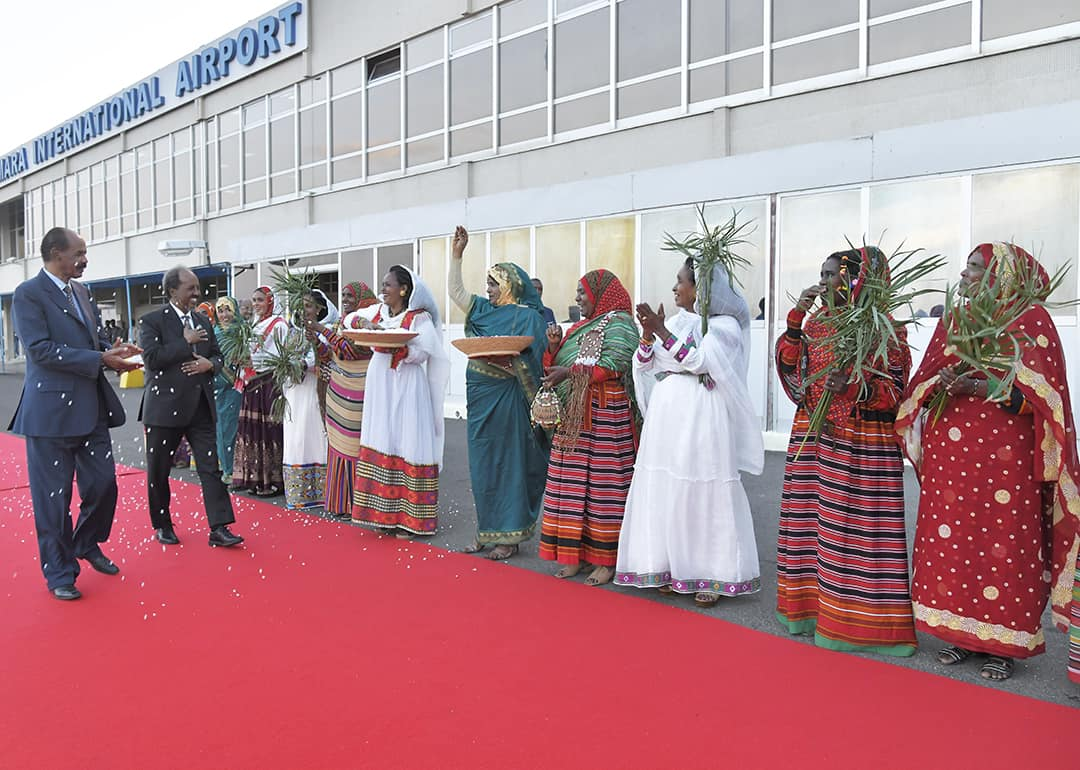The President of Somalia, Hassan Sheikh Mohamud, left for the Eritrean capital, Asmara, to meet his Eritrean counterpart Isaiah Afwerki, with whom he will discuss the strengthening of bilateral relations between the two countries. The Somali leader, according to a note from the presidency of Mogadishu, is accompanied on his mission by the Minister of Foreign Affairs, Ahmed Moalim Fiqi. Speaking to the news agency “Sonna” before his departure, the latter noted that the talks will also focus on regional issues affecting the Horn of Africa, with a focus on strengthening cooperation on key issues of mutual interest, especially security and stability in the region. According to sources cited by the Somali news site “Garowe Online”, in particular, during his stay in Asmara, Mohamud will participate in a tripartite dialogue with Egypt. This news, if confirmed, would pave the way for a potential military alliance between the three nations against Ethiopia, which could increase tensions in the Horn of Africa.
Already at the UN General Assembly, which was held last month in New York, a tripartite meeting took place between the Foreign Minister of Egypt, Badr Abdelatty, and their counterparts from Somalia and Eritrea, respectively Ahmed Moalim Fiqi and Osman Saleh, aimed at reaffirming the political will to achieve common goals and interests, maintain stability in the region and respect the sovereignty, unity and territorial integrity of Somalia. The three parties, the Cairo Foreign Ministry reports in an official note, "stressed the need to continue close coordination and cooperation on issues of common interest during the next phase, in the interest of the three peoples, in light of the bonds of brotherhood and friendship that unite them, as well as the harmony in visions and positions".
Egypt began delivering military supplies to Somalia in August, with several convoys carrying the weapons to a Ministry of Defense building and nearby military bases. According to press reports, the shipment includes 1938-millimeter M122 howitzers, anti-tank missiles and heavy ammunition, in what is the largest arms shipment since the embargo on Somalia was lifted. The port of Mogadishu has been closed to commercial traffic to allow for unloading. The arrival of the shipment is the first concrete step in Cairo's solidarity with its Somali ally in the context of the diplomatic crisis with Ethiopia. This support was reiterated a few weeks ago by Egyptian Foreign Minister Badr Abdelatty during his meeting with the US Secretary of State, Antony Blinken, equally determined to reiterate support for the “independence and territorial integrity” of Somalia.
After the military cooperation agreement signed with Somalia to send 10 Egyptian soldiers to Mogadishu, which infuriated neighboring Ethiopia, the government in Cairo is considering a similar agreement with Eritrea, which would also include bilateral measures to protect shipping in the Red Sea. The Emirati newspaper “The National” reports this, underlining that at the same time Egypt is also discussing with Asmara a possible Egyptian mediation in the decade-long conflict between the Eritrean government and the Tigray People's Liberation Front (TPLF), protagonist of the war that ended two years ago that pitted it against the Ethiopian army. The talks between Egypt and Eritrea follow a surprise visit made last month to Asmara by the head of Egyptian intelligence Kamal Abbas, very close to the president Abdel Fattah al-Sisi and accompanied by Foreign Minister Badr Abdelatty. The two delegates met with Eritrean President Isaias Afwerki, and according to the Egyptian Foreign Ministry, they delivered a direct message from Al Sisi aimed at “strengthening and developing bilateral relations in all fields”.
Egypt has sided politically with Somalia in its dispute with Ethiopia after signing a controversial maritime memorandum of understanding with the self-proclaimed republic of Somaliland, which is not recognized by Mogadishu. Under the agreement, which also involves the national carrier Ethiopian Airlines, Addis Ababa would gain access to the Red Sea via the port of Berbera, in exchange for recognition of its independence from Somalia. On this last point, Ethiopian authorities have been evasive, but the document has provoked wide reactions at the regional level. Somalia has received the support of Turkey, Egypt and Eritrea, while Ethiopia has strengthened its relations with Puntland, a regional state of Somalia traditionally in conflict with the federal government of President Hassan Sheikh Mohamud.







